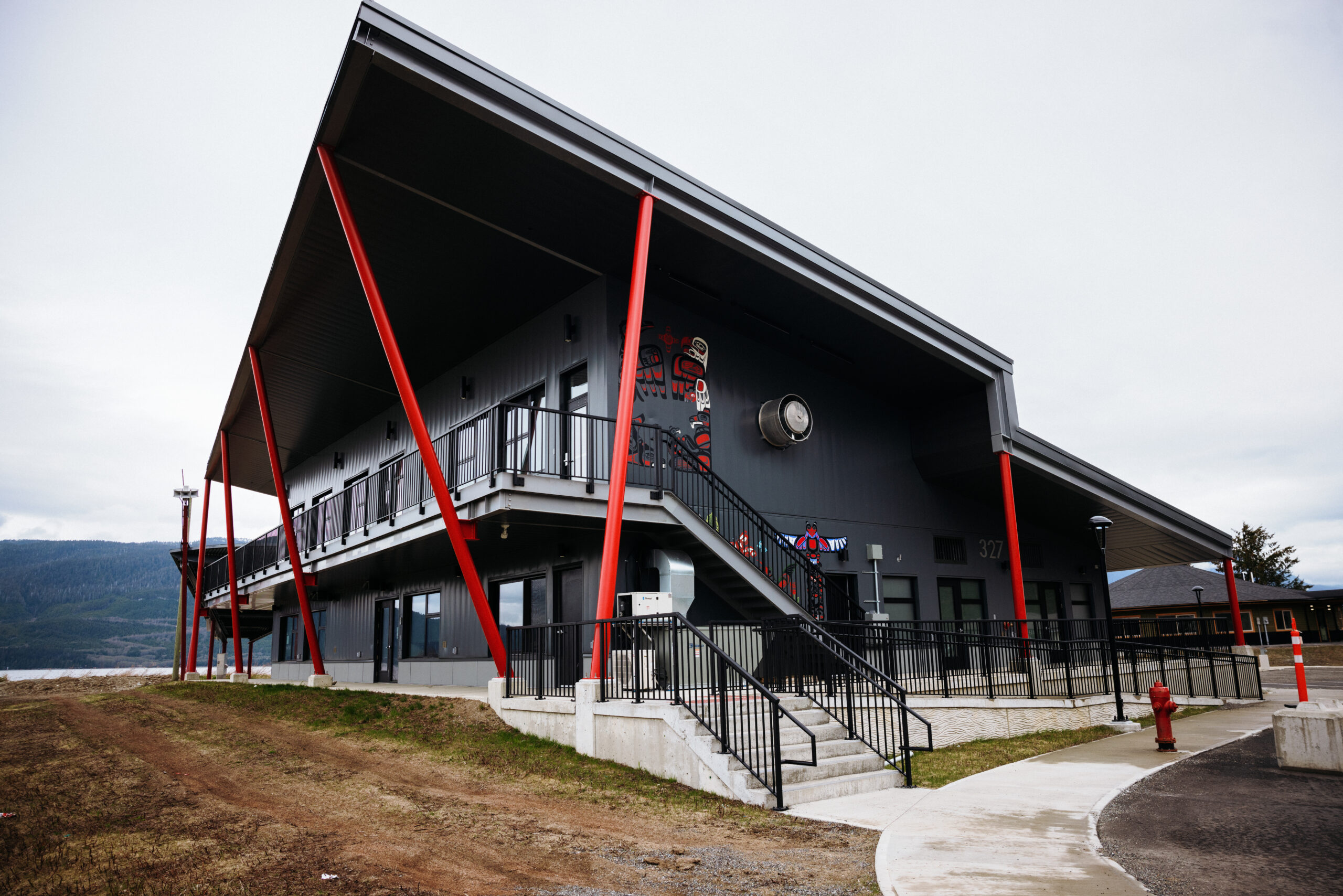
What Carney’s win means for environment and climate issues in Canada
Mark Carney and the Liberals have won the 2025 election. Here’s what that means for...
On a bitterly cold morning in early March, Gitxsan Simgiigyat (Hereditary Chiefs) stood outside the provincial Supreme Court building in Smithers, B.C., their regalia fending off the icy air.
“Our way of life has been subverted by the Canadian government,” Simogyat (Chief) Molaxan Norman Moore told a gathering of supporters and observers, his voice reverberating off the drab concrete building.
Inside, proceedings continued for a Hereditary Chief of the neighbouring Wet’suwet’en Nation, who was found guilty of criminal contempt in February. The Simgiigyat organized the demonstration to show their support for Dinï ze’ (Hereditary Chief) Dsta’hyl, who was arrested in October 2021 after decommissioning Coastal GasLink machinery at pipeline construction sites on his Likhts’amisyu Clan territory.
“They’re treating us as wards of the government. They’re treating us as minions,” Molaxan told The Narwhal in an interview. “We say things and it just goes past and they’re just sitting there, nonchalant. They’re brushing us off. The government is brushing us off.”

The Gitxsan and Wet’suwet’en have alliances that span thousands of years. But the Gitxsan Hereditary Chiefs’ public disapproval of government conduct is noteworthy, since it marks a departure from their previous approach to the fossil fuel industry.
While Wet’suwet’en Hereditary Chiefs have been more outspoken about their opposition to new pipelines, several Gitxsan Chiefs, including some who are now speaking out, signed agreements with the province in support of the Prince Rupert Gas Transmission project in 2014. If built, that pipeline would link fossil fuel sources in the northeast to Pacific shipping routes, carrying liquefied natural gas (LNG) across Gitxsan and numerous other First Nations’ territories. The agreements included funding and were paired with assurances of environmental protection and respect for Indigenous Rights.
The Gitxsan Simgiigyat still support the pipeline project on paper, but their vocal criticisms point to frustration with government and industry officials, who they feel are failing to deliver on the agreements they made nearly a decade ago. Their increasingly ambivalent position toward the project reflects multiple deepening tensions between First Nations, industry and government.
Since the Gitxsan pledged their support for the Prince Rupert Gas Transmission project, successive B.C. governments and industry proponents have described the LNG sector as a path to redressing historic wrongs, including addressing ongoing economic inequity. At the annual BC Natural Resources Forum in January, Indigenous-led projects like Cedar LNG and Ksi Lisims (which would receive gas from the Prince Rupert pipeline) were touted as bellwethers of how major projects should get built in B.C. and shining examples of what’s been dubbed “economic reconciliation.”
Some advocates for the LNG industry say these projects are win-win, providing a boost to the economy while sharing a stake with First Nations partners, who can influence how projects are built. A few industry advocates have even accused environmental groups of paternalistic colonialism for standing in the way of such partnerships by opposing First Nations that support fossil fuel development.

Murray Rankin, B.C. Minister of Indigenous Relations and Reconciliation, told The Narwhal the B.C. government is working with the Gitxsan Hereditary Chiefs.
“Recently, I met with Gitxsan Huwilp Government leadership, where we had good discussions on a number of interests,” Rankin wrote in an email, adding the provincial and federal governments are working with the Hereditary Chiefs on implementation of Gitxsan Rights and Title in treaty negotiations.
Simogyat Gwiiyeehl Brian Williams told The Narwhal the meeting with Rankin isn’t enough, noting his nation has yet to achieve genuine progress despite 40 years of ongoing negotiations with government.
If built, Prince Rupert Gas Transmission would ship natural gas to Ksi Lisims, a proposed liquefaction and export facility on Nisg̱a’a territory. The B.C. government approved the pipeline in 2014 and construction has to be substantially underway by the end of the year, otherwise the project’s environmental assessment certificate will expire.
On March 14, Calgary-based TC Energy announced it was selling the pipeline to the Nisg̱a’a Nation and its partner, Western LNG, a Texas-based fossil fuel company. TC Energy is the company responsible for the Coastal GasLink pipeline and is involved in legal disputes with Wet’suwet’en land defenders and their supporters. While the company is technically divesting ownership of the pipeline, the proposed Prince Rupert project would tap into its subsidiary, NOVA Gas Transmission, which is owned and operated by TC Energy.
The B.C. Environmental Assessment Office told The Narwhal the project’s initial five-year certificate was extended in 2019, and First Nations will be consulted as part of determining whether it qualifies for a “substantially started” designation.
Simogyat Luutkudziiwus Gordon Sebastian said discussions are underway between the Chiefs.
“We will definitely talk about it amongst ourselves, and if there’s good reason, we will probably just stop it,” he told Dogwood BC, an advocacy group that promotes environmental protections and Indigenous Rights. “It’s not a matter of getting out of the agreement or not, it’s just a matter of saying no pipeline.”
But the courts make it difficult for First Nations to say no, according to a 2019 report by the Yellowhead Institute, a research organization that focuses on Indigenous Rights. Their analysis reviewed a list of court injunctions related to resource projects and found 76 per cent of those filed by corporations against First Nations were granted, while 81 per cent of injunctions filed against corporations by First Nations were denied. In other words, the law tends to side with corporate interests.
“Government always favours big business over … us good little Indians,” Molaxan added.
Gwiiyeehl said this is why he would like to see a judicial review of decisions by the Supreme Court of B.C. and for cabinet ministers to meet with the Simgiigyat to address the pattern. He is particularly concerned by how the trajectory of legal orders issued in favour of corporations inevitably leads to RCMP enforcement and “reconciliation at the end of a gun.”
“One little trigger, little twitch, and you’re gone,” he said in an interview. “That’s how we feel.”
Meanwhile, more than $50 million in federal and provincial funding has been allocated to police enforcement of court injunctions related to Indigenous-led resistance to Coastal GasLink, on Wet’suwet’en and Gitxsan lands and across the country. Dsta’hyl’s 2021 arrest and subsequent conviction was directly related to an injunction issued to Coastal GasLink in 2019.
Molaxan told The Narwhal one of the main outcomes of the decision was a directive from the courts to First Nations, imploring them to “negotiate, not litigate.” The phrase was chanted by the Chiefs and their supporters at the Smithers rally in March, pointing out the hypocrisy as Crown prosecutors inside the courts set a sentencing date for the Wet’suwet’en Chief.
“It’s a two-way street,” he said. “The government … they’re the ones that are litigating. I thought that the law applies to them too.”

Governments, First Nations and courts have been navigating these types of issues and conflicts for decades as they grapple with the relationship between Indigenous Rights and economic development, according to a former public servant who once served as the federal government’s top bureaucrat.
“I think the consistent thing that First Nations have sought when it comes to resource development is a say in the decision making, about whether development goes forward and how it goes forward,” Michael Wernick, a former clerk of the Privy Council from 2016 to 2019, said.
Wernick, who also served as deputy minister of Indian and Northern Affairs from 2006 to 2014, said Indigenous leaders can leverage unresolved Rights and Title issues as a way to hold the government accountable on any decisions with larger implications for the economy and the health of local communities.
While he declined to comment specifically on the matters unfolding on Gitxsan territory, he said sovereign nations can point to provincial and federal commitments to Indigenous Rights legislation, for example.
“So it ends up being kind of a negotiation about, you know, ‘We won’t take you to court, we won’t block you, we won’t slow you down — if we get a benefits agreement or resource royalty sharing, or some kind of piece of the piece of it that we find acceptable,’ ” he said.
“I don’t want that to sound in any way negative,” he emphasized. “That’s a perfectly reasonable thing to do and it happens with non-Indigenous communities, too.”
He added the timing of the Gitxsan Chiefs speaking out is interesting, given the upcoming B.C. election.
“My guess would be that if you’re Premier Eby … you do not want this to flare up,” he said. “You would rather have some calm — at least until after the provincial election is over.”
Gwiiyeehl and Molaxan are no strangers to working with politicians and civil servants on thorny issues. Molaxan worked closely on the 1997 landmark Delgamuukw-Gisday’wa court case, in which the Supreme Court of Canada affirmed the Gitxsan and Wet’suwet’en nations had never given up Rights and Title to the combined 55,000 square kilometres of land, called laxyip and yintah, respectively. Both have been involved in negotiations with the provincial and federal governments for decades, including discussions around forestry, mining and pipeline development on the laxyip.
Rankin, the B.C. cabinet minister, said he is taking the lead on discussions with the Chiefs “to reconcile our respective laws and jurisdictions, in a way that responds to the unique context and priorities of the Gitxsan Nation, as set out by the Delgamuukw-Gisday’wa Supreme Court case.”
The 2015 agreement between the Simgiigyat and the provincial government was negotiated by John Rustad, former minister of Indigenous relations and current leader of the BC Conservatives. The document protects the provincial government from legal action, including “any court actions or proceedings that directly or indirectly challenge any government actions in relation to the natural gas pipeline project on the basis that the province has failed to consult or accommodate Gitxsan” or on the basis that the province has infringed any of the Gitxsan Nation’s constitutionally protected rights.
According to a 2020 article by Yellowhead Institute co-founder Shiri Pasternak that analyzed a draft contract between a Wet’suwet’en band council and Coastal GasLink, some benefits agreements between First Nations and industry proponents also include clauses that require First Nations leaders to “take all reasonable actions to persuade … members to not take any action, legal or otherwise, including any media or social media campaign, that may impede, hinder, frustrate, delay, stop or interfere with the project’s contractors, any authorizations or any approval processes.”
“We are forbidden from protesting and going in front and stopping it,” Molaxan said, referring to the restrictions in the agreements. “Not only that, but we cannot talk about it because they’re saying you’re going to incite people into riots.”

Opposition to the pipeline could set the stage for future conflict, especially if the courts and RCMP intervene. Tensions between Gitxsan and the federal police force have been building for years.
In 2021, following a now-infamous RCMP raid in which numerous Wet’suwet’en and Gitxsan land defenders and their supporters were arrested, Gitxsan community members set up a brief blockade on the CN Rail line and were met with an “overwhelming use of force,” according to Kolin Sutherland-Wilson, a Gitxsan member of Wilp (house group) Git’luuhl’um’hetxwit and current elected chief of the Kispiox band council.
“We are not here to get hurt, we are not here to get killed,” he told The Narwhal at the time. “We are here simply to hold the people at the top of the Canadian government accountable, because they have a responsibility to uphold Crown relations with sovereign Indigenous Peoples.”


Gwiiyeehl linked RCMP actions to industry, alleging the force’s controversial Community-Industry Response Group (now called the Critical Response Unit, referred to as CRU-BC) is beholden to protect the likes of pipeline projects.
“The RCMP is a product of Canada so now you’ve got industry employing Canada to get rid of the Indians at the point of a gun,” he said.
Staff Sergeant Kris Clark, with the RCMP’s media relations team, told The Narwhal the Mounties acknowledge and respect the concerns of the Simgiigyat but pushed back against the idea the unit is linked directly to industry.
“While I cannot speak to their specific allegation, there is a common misconception that CRU-BC only serves industry, but in reality, the community and its safety is at the core of its mandate,” Clark wrote in an email.
Clark added the RCMP is aware the Gitxsan Hereditary Chiefs told the police force to ensure members of the unit stay off Gitxsan lands.
“While the BC RCMP will do everything possible to respect the ban, we have lawful obligations and responsibilities to enforce the Supreme Court injunction and maintain public safety, which must take priority,” he wrote. “We acknowledge that due to the nature of the conflict, with the goal of the protesters to stop continued work, protests, physical conflict, civil litigation or other related tactics are almost inevitable. Ultimately, our response will depend on protest actions as CRU-BC intervention is only required when protests are no longer peaceful, lawful or safe.”
Wernick said all levels of government will be paying attention to how this unfolds.
“That is always something the federal government will keep an eye on,” he said. “There is a very easily activated network of sympathy protests and even some of the blockades … so if something flares up in one community, it’s not really containable.”
In an effort to find ways to work with the RCMP, Gwiiyeehl and Molaxan signed an agreement with the federal police force in December 2022. The agreement detailed a community safety plan to “deal with burgeoning safety crises between the RCMP and members of the Gitxsan people on their lands,” according to the Simgiigyat. Warren Brown, B.C.’s Chief Superintendent at the time, signed on behalf of the RCMP.
Since the signing, however, talks have stalled. Gwiiyeehl said Brown was transferred and they have had no follow up communication with his replacement or other members of the force.
“We had one meeting and we’re supposed to have another meeting, just to do dry runs to figure out ways that we can negotiate appropriately and find a reasonable means to access what we have,” he said. “We’ve never heard from his replacement. We’ve never heard anything from the local detachment.”
Clark contradicted the claim, saying, “The local detachment commander is engaged and has spoken to local Chiefs, Elders and other community members on this and many other matters concerning the Gitxsan and other Indigenous Peoples.”
He added, “Senior leaders in North District are ready and willing to participate in continued discussions but we must also acknowledge our legal obligations during such injunctions and that our response, as well as the resources needed, will be dependent upon protester actions.”
For Gwiiyeehl, discussion and dialogue remains the best course of action.
“We put our best foot forward. We signed an agreement and we’re willing to work together.”
Get the inside scoop on The Narwhal’s environment and climate reporting by signing up for our free newsletter. When I visited my reserve, Moose Factory,...
Continue reading
Mark Carney and the Liberals have won the 2025 election. Here’s what that means for...

An invasive pest threatens the survival of black ash trees — and the Mohawk art...

Xatśūll First Nation is challenging B.C.’s approval of Mount Polley mine’s tailings dam raising. Indigenous...

